In December, 2006 my friend and senior colleague Prof. James F. Strange, Professor of New Testament at the University of South Florida wrote a very interesting and provocative two-page review of my book, The Jesus Dynasty for Biblical Archaeology Review. That review has now been archived on the Biblical Archaeology web site, so you can read it here on-line. I am republishing my three-part response to this review because new evidence relevant to several of the issues raised in the book and the review has emerged.
It was Professor Strange who gave me my first field experience in archaeology at Sepphoris where he has been excavating since the 1980s. He is a brilliant scholar and one of the most careful and capable archaeologists in the field. On the whole Strange’s review is negative and he highlights what he considers to be the book’s many deficiencies, although he also remarks that it is a well-written fascinating read with much of value and importance. I have the deepest respect for Jim and consider it an honor for him to have written about my work.
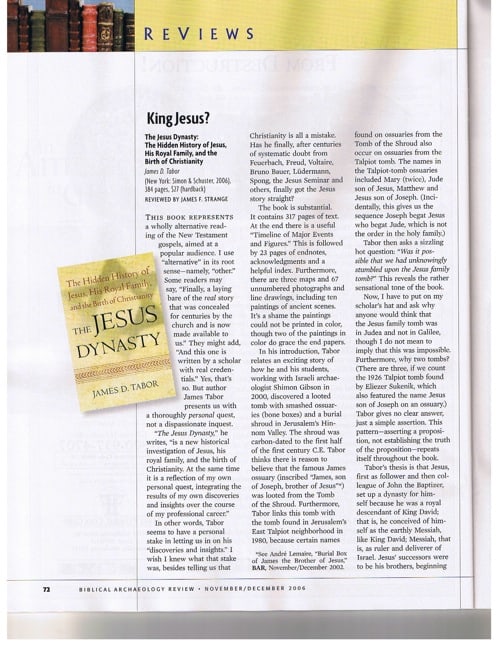
Since that review is now available more widely and the book, The Jesus Dynasty seems to be experiencing a new life even eleven years after publication, but I wanted to offer here some responses to his review, not so much along formal “academic” lines as a series of personal reflections.
Here is part 1:
Was Christianity All a Mistake?
…Tabor seems to have a personal stake in letting us in on his ‘discoveries and insights.’ I wish I knew what that stake was, besides telling us that Christianity is all a mistake. Has he finally, after centuries of systematic doubt from Feuerbach, Freud, Voltaire, Bruno Bauer, Lüdermann [sic], Spong, the Jesus Seminar and others, finally got the Jesus story straight?”
This is quite a list of figures, some of whom I would gladly associate myself with out of admiration for pioneering courage, given their culture and times (Freud, Voltaire), but other than Lüdemann, none of those listed would have much in common with my own approach or results in terms of the quest for the Historical Jesus. Bauer concluded that even the Gospel of Mark, though our earliest, was almost wholly fiction, a position quite opposite from my own. Indeed, I built my basic narrative framework around Mark and what I consider the reliable primitive structure of the Gospel of John. The Jesus Seminar, though hard to characterize with a single brush, would by and large scoff at the degree to which I accept the historical reliability of our Gospel sources. I actually think we can say with some assurance all sorts of things that Jesus did and said, and with a linguistic, chronological, and geographical detail that many critical scholars would question. In that sense I end up strangely “conservative” by such measures of conventional scholarship on the New Testament and early Christianity.
It is interesting that Prof. Strange mentions Gerd Lüdemann on this matter of whether I consider Christianity as all a mistake. I do indeed value Lüdemann’s pioneering and controversial book, The Resurrection of Jesus: History, Experience, Theology (Philadelphia, Fortress Press, 1994). In fact, I consider it to be one of the most important studies on the subject of the “historicity” of the notion of the “Resurrection of Jesus Christ” ever written. Its explicit aim was to prove the nonhistoricity of the resurrection of Jesus and thus encourage Christians to find a new grounding for faith based entirely on what he considers to be “the historical Jesus.” I strongly share that aim and consider my own work a small step in that direction. However, in Lüdemann’s subsequent work, The Resurrection of Christ: A Historical Inquiry (Prometheus Books, 2004), I am disappointed to see that Dr. Lüdemann repudiates his former position regarding a potential Reformation of Christianity on historical grounds, but frankly states that his latest work “…spells out in detail why the result of the nonhistoricity of the resurrection of Jesus leaves little if any room for Christianity.” In other words, Lüdemann gives up in his later work what I hold most dear–that a genuine recovery of the perspectives of the historical Jesus can, ironically, spell “life from the dead” for the cause that Jesus himself lived and died for–call it Christianity or not. The mistake I think he makes is to equate Paul’s visionary experience, which I think fundamentally dominates all subsequent definitions of “Christianity,” as determinative for defining what Jesus himself was all about, lived and died for, and for that matter–would have repudiated!
I guess what it comes down to is how one defines Christianity. My argument is that as one gets closer to the Founder, one also draws close to the original faith that one can define as a movement separate from other groups in “Judaism,” namely a Nazorean form of “Christianity,” indeed the “faith once delivered” that was subsequently taken in a decidedly different direction by Paul.
I hope that most readers of my book will sense on many levels, whether the academic, the descriptive, or the personal, that I have an engaged personal stake in the enterprise. Far from being an iconoclastic secularist, my whole life has been committed to what I consider to be the original and “true” view of Jesus of Nazareth himself. Accordingly, far from wanting to tell folks that “Christianity was all a mistake,” I want to affirm the opposite–that the original vision of John, Jesus, and James his brother can provide a new dynamic perspective in the new millennium. Yes, I do think it has been “hidden” and “lost,” as sensational as that sounds. But I present my arguments for a tiny glimpse of that original faith peeking through the mist of history, and I hope and trust these points will be not only convincing but inspiring to many who want to be faithful to Jesus. I try my best to say this in the Conclusion to the book, a section over which I labored long and hard to make clear. I regret that Dr. Strange did not seem to grasp that central point of my book. Yes, it is indeed a “personal narrative,” but one that argues with a passion that a recovery of the original vision of the founders of the movement we subsequently know as Christianity can truly lead to a new and fruitful faith. In that sense I think Dr. Strange is mistaken to cast me with the likes of Voltaire, Freud, Bauer, and even the collective Jesus Seminar–as much as I can appreciate the contributions of each of these. I stand decidedly on different ground, and as I try my best to convey. My model here is Albert Schweitzer–whom I consider to be a singular hero of the past century when it comes to to “historical Jesus” research–as honest as one can be historically, but never deaf to the ethical call of Jesus’ message of the Kingdom of God on earth. I dedicate The Jesus Dynasty to Schweitzer with these heartfelt words:
Ad memoriam Albert Schweitzer (1875-1965).
Missionary, philosopher, historian extraordinaire.
In whose shadow we all stand
You can read my post “Albert Schweitzer and a Thoroughly Apocalyptic Jesus (and Paul)” here, which is an exposition of his place as I see it in the field of historical Jesus studies as well as his influence upon me as a scholar.
You can continue reading Part 2 of this response here.

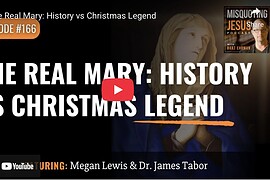

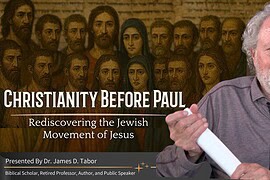


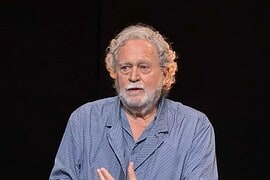

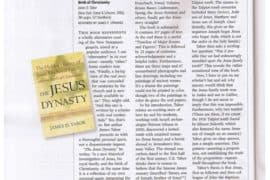
Comments are closed.